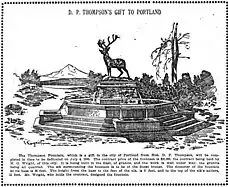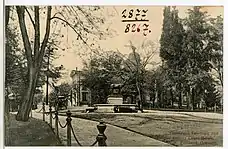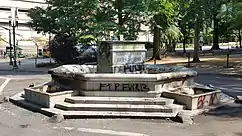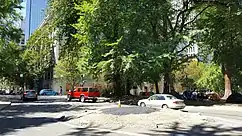Elk (sculpture)
Elk, also known as the David P. Thompson Fountain,[1] David P. Thompson Monument,[2] Elk Fountain, or the Thompson Elk,[3] was a historic outdoor fountain and bronze sculpture by American artist Roland Hinton Perry. The statue was donated to the city of Portland, Oregon, United States, in 1900 for display in Downtown Portland's Plaza Blocks. It is owned by Regional Arts & Culture Council (RACC).[4] The monument became a gathering place for demonstrations by George Floyd protesters, who lit several fires in the troughs along the base in July 2020.[5] The undamaged bronze elk statue was removed for cleaning and safekeeping on July 2, 2020.[4][6] The stone fountain was removed on July 17, 2020 after RACC determined there was severe damage to the stone and basin of the fountain.[5]
| Elk | |
|---|---|
| Elk Fountain, David P. Thompson Monument | |
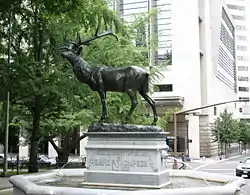 The sculpture in 2006 | |
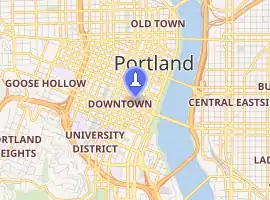
| |
| Artist | Roland Hinton Perry (statue) H.G. Wright (fountain) |
| Year | 1900 |
| Type | Sculpture |
| Medium |
|
| Subject | Elk |
| Designation | Portland Historic Landmark |
| Condition | removed for assessment (July 2020) |
| Location | Portland, Oregon, United States |
| 45.515721°N 122.677485°W | |
| Owner | Regional Arts & Culture Council |
Description
Elk, located at Southwest Main between 3rd and 4th Avenues between Chapman Square and Lownsdale Square in Portland's Plaza Blocks, features a bronze sculptures of an elk, resting on a granite base within an octagon-shaped basin. The statue and base are 9 feet (2.7 m) tall; the basin measures approximately 3 ft. 3 in. x 25 ft. x 8 ft.[2]
History
The monument was designed by Roland Hinton Perry, the sculptor of the Court of Neptune Fountain at the Library of Congress and Commonwealth, the statue atop the dome of the Pennsylvania State Capitol. The fountain and bronze sculpture was donated by former Portland mayor David P. Thompson in 1900 to commemorate the elk that once lived in the area.[3]
The project was completed within a budget of $20,000 under the direction of designer E.G. Wright. Constructed of Barre Granite, the fountain design specified a 25 feet (7.6 m) diameter and 8 feet (2.4 m) high base.[7] Wright had planned to complete the monument in time for a Fourth of July dedication to coincide with a city street carnival, but delays from removing nearby trees, widening Main Street, and connecting city water pipe forced Wright to delay completion of the monument. The 6,800-pound (3,100 kg) Elk was lifted into position in late August, and the Thompson Fountain was finished the first week of September 1900.[8] A carnival sponsored by the Portland Elks Club began that week, and The Oregonian informed its readers, "this is not a carnival elk."[9] According to the city, the Exalted Order of Elks refused to dedicate it because they considered the statue "a monstrosity of art."[10] A reporter for The Oregonian in 2020 explained that, "part of the problem might have been that [the Perry sculpture] didn't quite capture the animal found in Oregon's wilds," as it depicts neither an Olympic elk nor a Rocky Mountain elk.[11]
In 1974, Thompson's Elk and the Plaza Blocks were designated as Historic Landmarks by the city's Historic Landmarks Commission, under the name David P. Thompson Fountain.[1][12]
The sculpture appeared in Gus Van Sant's 1991 film My Own Private Idaho, where the elk was shown with a rider on it.[13][14]
The artwork was surveyed by the Smithsonian Institution's "Save Outdoor Sculpture!" program in 1993.[2]
The sculpture appears on the cover art for Portland band Agalloch's 2002 record, The Mantle.[15]
Vandalism and removal
The elk has been vandalized many times. It was vandalized during the Occupy Portland protest (2011), and had its antlers repaired in early 2012.[4] The statue was tagged with anti-Trump messages in 2016.[16]
On July 1, 2020, during the George Floyd protests, people protesting police violence built bonfires in two planter boxes beneath the elk statue.[17] The resulting structural damage to the granite base supporting the sculpture was deemed a safety hazard by the Regional Arts & Culture Council (RACC).[18] The city removed the unharmed bronze elk sculpture for cleaning on July 2.[4][19] After RACC determined that the stone and basin of the fountain were severely damaged, it was removed on July 17.[5][18][20] The status of the Elk fountain remained to be determined.[21] Following the deployment of federal forces to Portland, it was reported that as of July 30, the bare mound where the statue once stood remained a site of activity, with demonstrators arguing for and against its continued use for bonfires.[6] In late August, the statue was being kept "safely in storage".[11]
See also
- 1900 in art
- Elkhorn, Lee Kelly's 1979 deer sculpture at Portland's Catlin Gabel School
- Fountain for Company H (1914), also located in the Plaza Blocks
- List of monuments and memorials removed during the George Floyd protests
- Spanish–American War Soldier's Monument (1906), also located in the Plaza Blocks
References
- Portland Historic Landmarks Commission (July 2010), Historic Landmarks -- Portland, Oregon (XLS), retrieved May 8, 2016.
- "Elk, (sculpture)". Smithsonian Institution. Retrieved June 28, 2014.
- "Fountains in Parks: SW Portland". City of Portland, Oregon. Retrieved June 28, 2014.
- "Elk statue removed from downtown Portland after protesters set its base ablaze". KGW. July 2, 2020. Retrieved 2020-07-03.
- "Crews remove fountain that once served as elk statue's base". KATU. July 17, 2020. Retrieved 2020-07-20.
- Bernton, Hal (2020-07-30). "Man takes stand against street bonfire amid uncertainty over what happens next in Portland protests". The Seattle Times. Retrieved 2020-07-30.
- "D.P. Thompson's Gift to Portland". The Morning Oregonian. Portland: Henry Pittock. January 1, 1900. p. 23. Retrieved February 25, 2015.
- "Boys Can't Keep Away". The Morning Oregonian. Portland: Henry Pittock. September 5, 1900. p. 8. Retrieved February 25, 2015.
- "This Is not a Carnival Elk". The Morning Oregonian. Portland: Henry Pittock. August 20, 1900. p. 5. Retrieved February 25, 2015.
- "Find a Park | The City of Portland, Oregon". www.portlandoregon.gov.
- Perry, Douglas (August 26, 2020). "Beloved Portland 'Elk' statue is safely in storage while debate continues over why it had to be relocated". The Oregonian. Retrieved September 5, 2020.
- "City of Portland, Parks and Recreation: Chapman Square". Portland.gov. Retrieved July 23, 2020.
- Seiler, Margaret (July 23, 2020). "A Guide to the Buildings around the Main Portland Protests". Portland Monthly. Retrieved July 23, 2020.
- MacMurdo, Walker (October 11, 2016). "A Portland Walking Tour of "My Own Private Idaho"". Willamette Week. Retrieved 2020-07-23.
- De Los Muertos, Michael (2004). "Metal-Rules.com: Interview With Agalloch". metal-rules.com. Retrieved December 10, 2020.
- Lebrecque, Jackie (November 10, 2016). "Protesters deface downtown Portland elk statue with anti-Trump message". KATU.
- Ryan, Jim (July 2, 2020). "Portland protests against police violence, racism enter 5th week". The Oregonian.
- "Elk Statue removed after fires severely damage base". KOIN. July 2, 2020. Retrieved 2020-07-18.
- Riski, Tess (July 2, 2020). "City of Portland Will Remove Downtown Elk Statue After Protesters Burned It". Willamette Week. Retrieved 2020-07-03.
- Acker, Lizzy (2020-07-02). "Iconic Portland elk statue removed from downtown after fire set during protest". The Oregonian. Retrieved 2020-07-20.
- "Clean up continues at Portland parks; future of Elk Fountain unclear". KPTV. July 17, 2020. Retrieved 2020-07-30.
External links
| Wikimedia Commons has media related to Elk (Perry). |
- Public Art Search: Elk, Regional Arts & Culture Council
- The Thompson Elk, after 111 years, has seen it all -- including Occupy Portland by John Terry (November 19, 2011), The Oregonian
- Experts Critique Portland's Most Famous Public Art, by Joe Streckert (December 9, 1015), Portland Monthly
